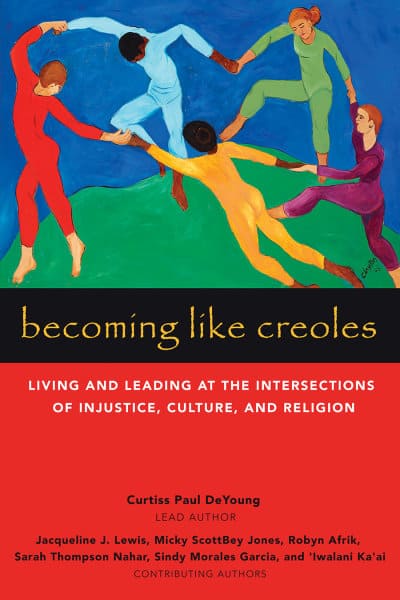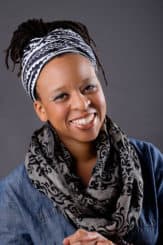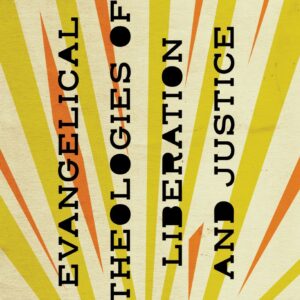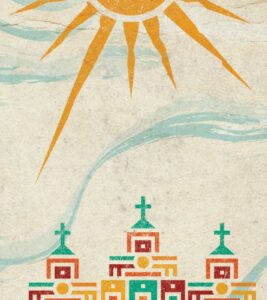
After the death of Trayvon Martin in 2012, I was forever changed. Nothing could remain the same—not my mothering, not my relationships, not my faith. I needed more than The Power of a Praying Wife. I needed a Christian faith that could actually handle my distress and confusion and loneliness of being a Black mother in a mostly white neighborhood who was terrified to send her babies outside in the same hoodies they wore the day before.
As I was wrestling with things that were bubbling up in the cultural landscape like the murder of Black boys in hoodies and middle-class families abandoning public school systems, I decided to go to seminary. I was already feeling like an ill-fitting puzzle piece in my church. I felt like we were speaking the same words in liturgy, with increasingly different spiritual understandings. I was the only person of color that attended regularly. I felt like the only one interested in a theological and spiritual response to various social crisis—Black Lives Matter, deportations, and more. The feeling, and at times choice, of isolation continued to grow. I felt largely unseen by and unable to connect with my pastoral staff and faith community as I became increasingly vocal about race and the intersecting oppressions of life in the United States.
I felt largely unseen by and unable to connect with my pastoral staff and faith community as I became increasingly vocal about race and the intersecting oppressions of life in the United States.
I chose the Master of Arts in Intercultural Studies degree program and co-learning community of the North American Institute of Indigenous Theological Studies (NAIITS) after a semester in a standard and ill-fitting distance MDiv program. One of the central themes of Indigenous theology has been discerning personally and theologically the question, “Can you be Indian and Christian?” Or in other words, what does it mean to be Indian and Christian? Can it even be done? The answer to this question has been answered for Indigenous people by papal order, various doctrines, residential schools, and scientific racism. Declared non-human or barely human, of course they were ineligible for salvation. So those who were not eliminated through brutal enslavement or genocide were civilized, that is, made white to be candidates for salvation. Civilization meant, of course, no Indian left—as it was said, “Kill the Indian, save the man.” The task has been to reclaim and declare the Indigenous humanity that was stolen, including their spirituality, and build a culturally rich, relevant, and faithful Christianity honoring their innate connections with the Creator.
My question arose, “Can I be Black and Christian?” What does it mean for me as a Black person, a Black woman, to be a Christian? Can it even be done? As a woman whose people were forcibly brought here, given selected and manipulated Christianity as the only religion, and stripped of culture, language, knowledge, and spirituality, how do I not just react to the theologies of white men? But instead can I take back the fullness of my Blackness, affirming how it has been damaged, targeted, and stolen, and examine if it can co-exist with a robust, living, culturally rich, relevant, and faithful Christianity? Has too much damage been done to Black people, and to me personally as a Black woman, in the name of Christianity, for me to find value in the Scripture, traditions, and communities formed in the name of Jesus?
I have continued to ask myself what a culturally rich and relevant Black and Christian life and community can look like. I want to know what it looks like in my own practice as well. What does it mean to revive the traditions connected to the spiritual practice of enslaved and free Blacks who brilliantly hid their own worship traditions inside of the Christian practices they were forced to adopt? I continue to struggle with and experiment with what my Blackness and my reverence for Jesus means for an integrated faith practice.
When I went looking for theology to rebuild my faith after its unraveling, I had not only the frayed strings of the churches I had grown up with, I had Black theology, liberation theology, feminist, postcolonial, womanist, Indigenous, and queer theologies all bringing colorful strands with which I could choose from to weave together my evolving culturally particular faith journey and practice. I benefit from the faithfulness of the last two generations of non-white, queer, non-male theologians (outside of what is often just called “theology”) who modeled what it was to wrestle with identity, culture, theological tradition, and praxis. When I found womanist theology, it was like coming home to myself. There was so much that resonated with where I was as a Black woman mothering young children and holding both the joys and pain of being everything I was and where I saw myself growing as liberation focused for all.
Micky ScottBey Jones —the Justice Doula—is a womanist contemplative activist, healer, nonviolent direct action organizer and consultant who facilitates conferences, workshops, pilgrimages, retreats and online conversations. She writes and speaks on a variety of topics including healing justice, communal self-care, contemplative activism, intersectionality and theology from the margins. Micky has an M.A. in Intercultural Studies and is an Associate Fellow of Racial Justice with Christians for Social Action. She is the Director of Healing Justice at Faith Matters Network based in Nashville, TN. Micky was named one of the Black Christian leaders changing the world in Huffington Post. You can interact with her work and collaborations on her website. This excerpt was taken from Becoming Like Creoles: Living and Leading at the Intersections of Injustice, Culture, and Religion by Curtiss Paul DeYoung, et al. / Fortress Press, 2019 and is reprinted here with permission.
—the Justice Doula—is a womanist contemplative activist, healer, nonviolent direct action organizer and consultant who facilitates conferences, workshops, pilgrimages, retreats and online conversations. She writes and speaks on a variety of topics including healing justice, communal self-care, contemplative activism, intersectionality and theology from the margins. Micky has an M.A. in Intercultural Studies and is an Associate Fellow of Racial Justice with Christians for Social Action. She is the Director of Healing Justice at Faith Matters Network based in Nashville, TN. Micky was named one of the Black Christian leaders changing the world in Huffington Post. You can interact with her work and collaborations on her website. This excerpt was taken from Becoming Like Creoles: Living and Leading at the Intersections of Injustice, Culture, and Religion by Curtiss Paul DeYoung, et al. / Fortress Press, 2019 and is reprinted here with permission.


